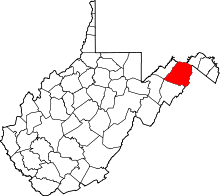Wilson-Wodrow-Mytinger House
|
Wilson-Wodrow-Mytinger House | |
|
Front of the house | |
  | |
| Location | 51 W. Gravel Lane, Romney, West Virginia |
|---|---|
| Coordinates | 39°20′29″N 78°45′27″W / 39.34139°N 78.75750°WCoordinates: 39°20′29″N 78°45′27″W / 39.34139°N 78.75750°W |
| Area | 1 acre (0.40 ha) |
| Built | 1750 |
| Architectural style | Log building |
| NRHP Reference # | 77001375[1] |
| Added to NRHP | August 22, 1977 |
The Wilson-Wodrow-Mytinger House is believed to be the oldest house in Romney and the oldest public office building in the U.S. state of West Virginia. An assemblage of three separate buildings—a kitchen, a dwelling and an office—the Mytinger House, as it is commonly known, was built during colonial times probably dating from the 1740s to the 1780s, although there are no records to indicate the exact dates.[2]
According to records in the Hampshire County Courthouse, Colonel George Wilson received a patent on this property from Thomas Fairfax, 6th Lord Fairfax of Cameron in 1763. George Wilson was a major in the Hampshire County Militia during the French and Indian War and was praised by George Washington for his zeal and bravery. Wilson was also the leader in whipping up sentiment for the Revolution and became Lieutenant Colonel in the Eighth Pennsylvania Regiment. He died during the long march the Pennsylvanians made in late winter, 1777, to join Washington in New Jersey.
Wilson's daughter, Mary Ann, married another patriot, Andrew Wodrow. Wodrow had set up a thriving import business in the 1770s, but threw over his business rather than handle English goods. He put his stock of goods up for public auction and sent the profits to Boston to aid patriots there. He then became the clerk of the Revolutionary Committee in King George County, Virginia. In 1782, Wodrow was assigned by the new Commonwealth of Virginia to come to Hampshire County to take over authority as Clerk of the Court from Fairfax's man. He remained in that position until his death in 1814. It was during this time that he built the office; and he went to great expense to add beauty and dignity to this building, which is still evident today. Gone now from the property is the old log house where George Washington spent the night on October 9, 1770, during his last visit to Romney.
The architecture of the three remaining buildings is representative of a time period spanning much of the early history and development of Romney. The architectural style and construction of the dwelling (second house) is very much like examples found in sections of Tidewater Maryland, that date about 1730. Whatever its origins, the building would have been an expensive and pretentious structure for the area and time. The half-timbered construction with brick nogging, the double brick chimneys with connecting pent, and the medieval floor plan are features not associated with what is now West Virginia.
Wodrow's office is considered to be the oldest office in the state used as a public office. It is outstanding today for its paneled walls and woodwork that are reminiscent of a style prevalent in Williamsburg. The building must have been most impressive to the people of Hampshire County in the 1780s.
For the next 170 years the property was owned by such people as John McDowell, Wodrow's son-in-law; Dr. McClintoch, one of Romney's first physicians; the Mytinger family, in whose hands the property remained for 100 years; Manning Williams, who was responsible for the restoration work; the Herbert Stelling family; and is now owned by Tom Stump, Lowell Hott, and Dottie Eddis.
Image gallery
- Front structure (c. 1788)
- Historical marker
- Historical marker
- Front structure (c. 1788)
- Front structure (c. 1788)
- Middle structure (c. 1760)
- Middle structure (c. 1760)
- Middle structure (c. 1760)
- Front structure (c. 1788)
See also
- List of historic sites in Hampshire County, West Virginia
- National Register of Historic Places listings in Hampshire County, West Virginia
References
- ↑ National Park Service (2009-03-13). "National Register Information System". National Register of Historic Places. National Park Service.
- ↑ Phillip R. Pitts and James E. Harding (October 1976). "National Register of Historic Places Inventory Nomination Form: Wilson-Wodrow-Mytinger House" (PDF). State of West Virginia, West Virginia Division of Culture and History, Historic Preservation. Retrieved 2011-08-05.
- Hampshire County West Virginia 1754-2004 "The Wilson-Wodrow-Mytinger House" courtesy of Dr. Lowell H. Hott.
External links
![]() Media related to Wilson-Wodrow-Mytinger House (Romney, West Virginia) at Wikimedia Commons
Media related to Wilson-Wodrow-Mytinger House (Romney, West Virginia) at Wikimedia Commons

